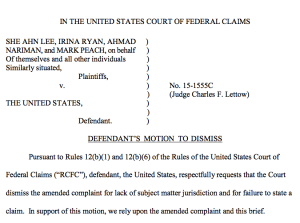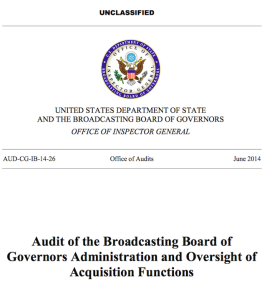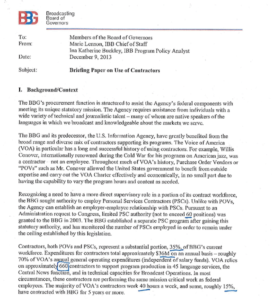BBG Watch EXCLUSIVE
 In the $400 million class action lawsuit against the Broadcasting Board of Governors (BBG) for failure to properly compensate contract employees who work and have worked for it, lawyers for the agency and the U.S. Department of Justice filed their anticipated motion to dismiss the action.
In the $400 million class action lawsuit against the Broadcasting Board of Governors (BBG) for failure to properly compensate contract employees who work and have worked for it, lawyers for the agency and the U.S. Department of Justice filed their anticipated motion to dismiss the action.
The government is arguing that claims under contract theories are not ripe because BBG contract employees did not exhaust administrative remedies by appealing first to the BBG’s Contracting Office. The government is also arguing that claims of BBG contract employees under the Back Pay Act should be dismissed because they are not “appointed in the civil service” and the Back Pay Act only covers claims by those “appointed in the civil service.”
In the motion, the government alleges that, without addressing the facts, the case should be dismissed on legal grounds.
 According to Themis PLLC, the Washington, DC law firm which represents action members, this is a routine and expected procedural matter undertaken in civil litigation.
According to Themis PLLC, the Washington, DC law firm which represents action members, this is a routine and expected procedural matter undertaken in civil litigation.
All defendants in civil litigation attempt to persuade the Court to dismiss the action on the basis of law without addressing the merits, the law firm told its clients and prospective class members. “We fully anticipated the government’s motion and months ago began our research to address and overcome the government’s arguments,” Themis PLLC wrote in an email sent out on April 29.
Themis PLLC said it will be filing its opposition to the government’s motion in the next two to four weeks.
“We believe the government’s arguments are wrong and we will be attacking those arguments on many fronts. We are confident that both the law and facts will be on our side when we fully brief the issues to the Court,” Themis PLLC said in an email.
In a follow-up email, the law firm made these additional points:
“We foresaw these defenses from the outset of our preparation of the complaint many months ago and are very confident of our ability to overcome them. The government’s argument that the plaintiffs needed to file their claims first with their contracting officers is particularly hollow. It is a reach by the government’s legal department without any understanding of the underlying facts. The OIG found many problems within the C.O. itself, which mirrored the experience of every contractor who had to deal with them. One need only analyze the futility of taking each and every contractor through the contracting officers by looking at the hundreds or thousands of illegal contracts those C.O.’s have already issued, according to the OIG. Meanwhile, the BBG’s leadership long ago decided to avoid payment of contractor claims for back pay, which the BBG leadership has anticipated for years, so the hands of the C.O.’s are tied to that official policy of denying legitimate claims. The contractors have been complaining to their C.O.’s for years without getting any relief, because their plight was planned from the top of the organization. This class action is their only hope and we believe the court will agree.”
“The government also contends that Class Members were not appointed to the civil service, which disqualifies the Back Pay Act as an avenue for relief. However, there are precedents for considering a contractor’s claims on the merits, under the BPA, to determine whether he was in fact working as an employee. The government’s argument also ignores the fact that not only is the BBG responsible for creating appointment problems, it did so intentionally. The OIG found and the BBG admitted that it should have acquired personal services through the appointment process and paid benefits to those positions. The BBG’s explanation was simply that it costs more to follow the law and it wanted to save money.”
“The questions then are 1) whether the BPA allows an agency to intentionally, as opposed to mistakenly, corrupt the hiring process in order to deny benefits to its hires and 2) whether that same corruption also divests those same individuals of their right to remedy the injuries caused by the same agency failures. We believe the Court will agree with us that the BBG cannot distort the law as it sees fit. BBG contractors already have been awarded relief, as employees, under the tax and discrimination laws, notwithstanding the lack of appointments. The court should not punish the contractors again, and reward the BBG’s willful lawbreaking, by denying the relief that is available to appointed employees.”
According to Themis PLLC, the class action lawsuit seeks back pay and other financial compensation for all qualifying individuals who opt-in to the class. The firm stated that independent contractors providing personal services to the BBG must affirmatively join the class to benefit from any recovery. The special Themis PLLC webpage provides information how to join the class action lawsuit, why contractors should consider joining now, how the firm claims it will protect their confidentiality, and what they might be able to recover at no cost to themselves.
The main Themis PLLC website address is: http://www.themis.us.com.
The Themis PLLC special BBG class action lawsuit information page address is: http://themis.us.com/BBGLitigation/.
ALSO READ: Washington Post expanded column offers new details on Voice of America contracting scandal, BBG Watch, November 24, 2014.
Agency few Americans use generates controversy, this time with contractors, Joe Davidson, The Washington Post, November 24, 2014.
OIG Audit of the Broadcasting Board of Governors Administration and Oversight of Acquisition Functions
BBG Briefing Paper on Use of Contractors
DISCLAIMER: BBG Watch does not offer legal or any other professional advice. If such advice or other expert assistance is required, the services of a competent professional person should be sought. Use of this BBG Watch web site, its contents, and links is not a substitute for legal, medical, tax, financial, accounting, or risk management advice. While we make every effort to include accurate, up-to-date, and objective information and analysis, the nature of news reporting, news and policy analysis, and work done under the pressures of deadlines carry with them risks of errors, omissions, and subjective judgments.


